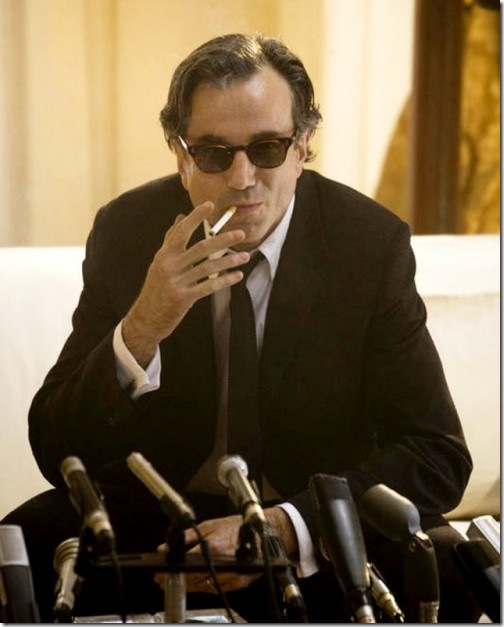Prior to its Christmas Day expansion across the country, Rob Marshall’s screen version of the Broadway musical Nine — itself an audacious adaptation of 8½, Federico Fellini’s 1963 statement of cinematic writer’s block — had only opened in New York and Los Angeles, where it had already received a barrage of negative reviews.
Well, do not believe those pans, which not only dismiss this very entertaining, albeit dark-toned and brooding film, but go out of their way to also retroactively slam Marshall’s debut movie, the multiple-Oscar winner, Chicago. True, Marshall again seems apologetic about interrupting the story with his musical numbers, inventing another stylized, parallel universe in which the songs live, but those songs are invariably sophisticated and sensual, with plenty of character-driven complexity.
Instead of hiding the musical’s stage roots, Marshall flaunts them, and maybe that is the source of some film critics’ problems with Nine. It opens with a theatrical overture, during which the women in fictional film director Guido Contini’s life are introduced to us as they slink onto a Cinecitta sound stage’s half-constructed sets. Two hours later, all the characters take genuine curtain calls, followed by production stills of rehearsals during the final credits.
No wonder this movie is being called stagy. I just happen to consider the term a compliment.
Like 8½, Nine is the story of an Italian filmmaker, burdened by the proclamations of his genius. He is creatively frozen, without a single word of his latest screenplay written, even though the start of production is imminent.
Contini is at the center of Nine, with the women in his life surrounding him like satellites. They include his gradually losing-patience wife, Luisa (Marion Cotillard), the spirit of his late mother (Sophia Loren), his muse and frequent screen leading lady Claudia (Nicole Kidman), his feral mistress (Penelope Cruz), his costume designer/confidante (Judi Dench), a Vogue writer eager to bed Guido for an interview (Kate Hudson) and the prostitute who first introduced him to sex at the title age of 9 (Fergie of the Black-Eyed Peas).
Five of them are Oscar winners, a few have experience with musicals, but all sing well — ranging from passably to exceptionally — and move with the assurance of dancers, which none of them are. In the case of Cruz, in the number A Letter From the Vatican, all she called on to do is writhe seductively, which she certainly manages if my fogged-up glasses are proof.
Still, the crux of the story is Contini, played originally on stage by Raul Julia in 1982, then Antonio Banderas in the Broadway revival 21 years later. Following along those Hispanic lines, Javier Bardem was signed to make the movie, but he begged off early on, replaced by Daniel Day-Lewis, a brilliant chameleon-like actor, but even less Italian than his predecessors and with no musicals on his resume.
It was a risky casting choice, but as soon as Day-Lewis opens his mouth and speaks with an entirely persuasive Italian accent, you will be won over. When he sings his first song as he climbs all over the skeletal set, searching for inspiration, he convinces you that he is Guido, channeling 8½’s Marcello Mastroianni.
Following a press conference, where it becomes clear that Guido lacks a suitable idea for his latest movie, he escapes to a seaside spa where he hopes to find inspiration, but instead finds the luscious distraction of Carla. His resort getaway turns out to be one of the worst kept secrets, and soon the rest of his production team follows — along with his wife — much to his chagrin.
Those familiar with the stage musical had better be prepared for the wholesale plot changes wrought by screenwriters Michael Tolkin (The Player) and the late Anthony Minghella (The English Patient). In the show, because of a stray comment by Claudia, Contini decides to make a film version of Casanova, which naturally mirrors his own life. For the movie, that whole subplot has been dropped, though his eventual project is a reflection of his career in a different manner.
Much of the original score has been jettisoned, with composer-lyricist Maury Yeston penning two new numbers. One, called Cinema Italiano, is a frenetic salute to the New Wave sung in ‘60s retro style by Hudson, a new character and largely extraneous. The other, Take It All, is an ultimatum-cum-striptease for Cotillard, a better scene than song, at least on first hearing.
Dench’s character is also newly created, but she is woven into the action quite well, morphed from the show’s producer into a longtime colleague of Contini’s. She nevertheless gets to sing the strutting Folies-Bergere number, whether it makes much sense coming from her or not.
In his own way, Marshall has made an hommage to Fellini, inserting memory flashbacks for Guido in evocative, grainy black-and-white. Because the script goes out of its way to make Guido unlikeable, Nine will probably not gain a wide audience, but musical theater fans, Fellini groupies and anyone who wants to see another brilliant performance by Day-Lewis should put this on their holiday viewing list.
NINE. Studio: The Weinstein Company; Director: Rob Marshall; Cast: Daniel Day-Lewis, Marion Cotillard, Penelope Cruz, Judi Dench, Nicole Kidman, Kate Hudson, Stacy Ferguson, Sophia Loren. Rated: PG-13; Opens: Today.
